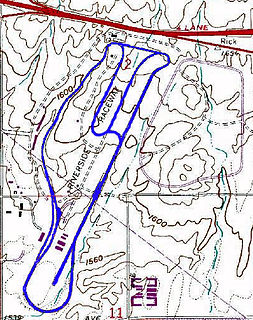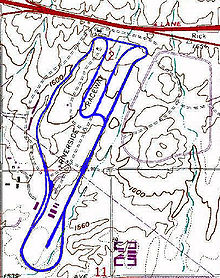
Robert Arthur Allison is a former American professional stock car racing driver and owner. Allison was the founder of the Alabama Gang, a group of drivers based in Hueytown, Alabama, where there were abundant short tracks with high purses. Allison raced competitively in the NASCAR Cup Series from 1961 to 1988, while regularly competing in short track events throughout his career. He also raced in IndyCar, Trans-Am, and Can-Am. Named one of NASCAR's 50 greatest drivers and a member of the NASCAR Hall of Fame, he was the 1983 Winston Cup champion and won the Daytona 500 in 1978, 1982, and 1988.

Mark Neary Donohue Jr., nicknamed "Captain Nice," and later "Dark Monohue," was an American race car driver and engineer known for his ability to set up his own race car as well as driving it to victories.
The 1976 NASCAR Grand National Winston Cup Series was the 28th season of professional stock car racing in the United States and the 5th modern era NASCAR Cup series. The season began on Sunday, January 18 and ended on Sunday, November 21. Cale Yarborough, driving the #11 Junior Johnson Holly Farms Chevrolet scored his first of three consecutive NASCAR Grand National Series Winston Cup Championships. Skip Manning was named NASCAR Rookie of the Year.
The 1984 NASCAR Winston Cup Series was the 36th season of professional stock car racing in the United States and the 13th modern-era Cup series season. It began on Sunday, February 19 and ended on Sunday, November 18. Terry Labonte was crowned champion at the end of the season. This was the final year for Chrysler until Dodge returned in 2001.
The 1974 NASCAR Winston Cup Series was the 26th season of professional stock car racing in the United States and the 3rd modern-era NASCAR Cup series. The season began on Sunday January 20 and ended on Sunday November 24. The first 15 races were shortened 10 percent due to the 1973 oil crisis. Following criticism of the 1972 and 1973 points systems that placed emphasis on completed miles, NASCAR implemented a new points system, that took basic purse winnings, multiplied by number of starts, and divided by 1,000; it was designed to more directly reward winning races, a response to Benny Parsons' championship the previous year with just one win. Richard Petty was Winston Cup champion at the end of the season finishing 567.45 points ahead of Cale Yarborough, while David Pearson finished a strong third in points despite only nineteen starts. Earl Ross was named NASCAR Rookie of the Year.
The 1977 NASCAR Grand National Winston Cup Series was the 29th season of professional stock car racing in the United States and the 6th modern era NASCAR Cup series. The season began on Sunday, January 16 and ended on Sunday, November 20. Cale Yarborough driving the Junior Johnson #11 Holly Farms Chevrolet won his second consecutive NASCAR Grand National Series Winston Cup Championship. Ricky Rudd was crowned NASCAR Rookie of the Year.

The NASCAR Cup Series has held stock car races annually at Michigan International Speedway in Brooklyn, Michigan since 1969. Traditionally, the track held two Cup Series races, one in June, around Father's Day weekend and another in August. The August race was not held in 1973 after track owner Roger Penske replaced the race with a Champ Car event. In 2020, both races were held over a single weekend in August due to the COVID-19 pandemic. In 2021, the June race was dropped from the schedule as part of a realignment, with its place on the schedule being given to Texas Motor Speedway to host the All-Star Race.
The 1970 Tidewater 300 was a NASCAR Grand National Series event that was held on Sunday, November 22, 1970, at Langley Field Speedway in Hampton, Virginia.

The 1971 Motor Trend 500 was the first race in NASCAR's Winston Cup era that took place on January 10, 1971. 191 laps on a road course at Riverside International Raceway in Riverside, California that spanned a total distance of 2.620 miles (4.216 km).
The 1972 NASCAR Winston Cup Series was the 24th season of professional stock car racing in the United States and the 1st modern-era NASCAR Cup series season. The season began on Sunday January 23 and ended on Sunday November 12. Richard Petty won his second consecutive Winston Cup Championship and fourth overall. Larry Smith was named NASCAR Rookie of the Year.
The 1973 NASCAR Winston Cup Series was the 25th season of professional stock car racing in the United States and the 2nd modern-era Cup season. The season began on Sunday January 21 and ended on Sunday October 21. 31 races were scheduled in the 1973 season. 28 were held.

The 1975 NASCAR Grand National Winston Cup Series was the 27th season of professional stock car racing in the United States and the 4th season in the modern era of the NASCAR Cup series. The season began on Sunday, January 19 and ended on Sunday, November 12. Richard Petty, driving the #43 Petty Enterprises STP Dodge scored his sixth NASCAR Grand National Series Winston Cup Championship. Bruce Hill was named NASCAR Rookie of the Year. NASCAR introduced a new points system for 1975, a system designed by statistician Bob Latford. For the first time, each race on the NASCAR Winston Cup Grand National schedule carried an equal point value, a system that would be used for 36 seasons, from 1975 to 2010. The original points system ran for the first 29 seasons, from 1975 to 2003.
The 1978 NASCAR Grand National Winston Cup Series was the 30th season of professional stock car racing in the United States and the 7th modern era NASCAR Cup series. The season began on Sunday, January 22 and ended on Sunday, November 19. Cale Yarborough driving the Junior Johnson #11 First National City Travelers Checks Oldsmobile won his then record third consecutive NASCAR Grand National Winston Cup Winston Cup. Ronnie Thomas was crowned NASCAR Rookie of the Year in a tight battle with Roger Hamby.
The 1971 Myers Brothers 250 was a NASCAR Winston Cup Series event that took place on August 6, 1971, at Bowman Gray Stadium in Winston-Salem, North Carolina. This race was the final NASCAR cup series event at Bowman Gray Stadium.

The 1973 Tuborg 400 was a NASCAR Winston Cup Series race that took place on June 17, 1973, at Riverside International Raceway in Riverside, California.

The 1976 Riverside 400 was a NASCAR Winston Cup Series racing event that took place on June 13, 1976, at Riverside International Raceway in Riverside, California. The California 150 for sportsman cars was run prior to this race. The winner was Ivan Baldwin followed by Dan Clark and Jim Sanderson.

The 1979 Winston Western 500 was a NASCAR Winston Cup Series racing event that took place on January 14, 1979, at Riverside International Raceway in Riverside, California. Buying a souvenir program at this race was relatively inexpensive for the era at $2 USD per copy.

The 1971 World 600, the 12th running of the event, was a NASCAR Winston Cup Series racing event that took place on May 30, 1971, at Charlotte Motor Speedway in Concord, North Carolina. It marked the return of Chevrolet to NASCAR.

The 1979 Northwestern Bank 400 was a NASCAR Winston Cup Series race that took place on March 25, 1979, at North Wilkesboro Speedway in North Wilkesboro, North Carolina.

The 1975 Winston Western 500 was a NASCAR Winston Cup Series racing event that took place on January 19, 1975, at Riverside International Raceway in Riverside, California. A companion race known as the Permatex 200, in the Late Model Sportsmen Series, would be held one day prior to this event on the same track.








